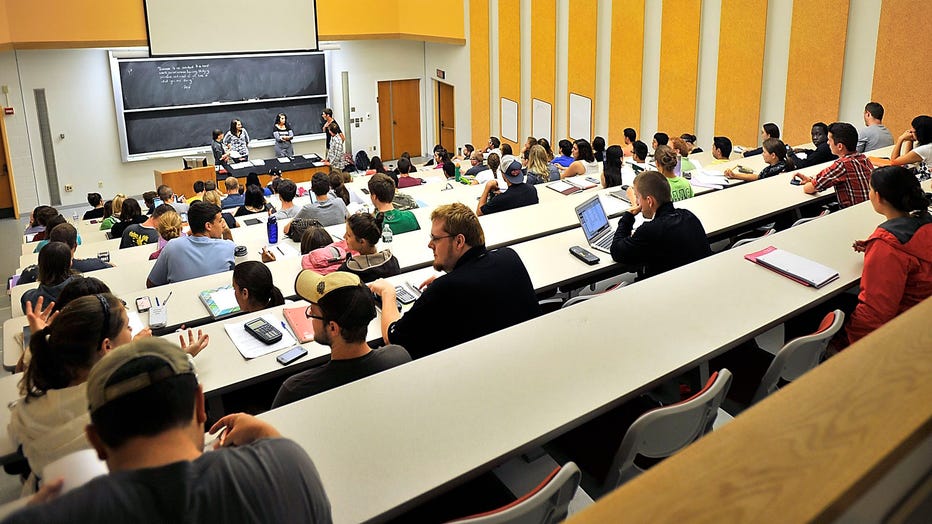New FAFSA issue could delay financial aid for college students this fall
Some college students may not be able to pay for tuition, books and other bills when classes start in a few weeks due to the latest hiccup in submitting FAFSA forms to the U.S. Department of Education.
The federal agency announced Tuesday that colleges will not be able to submit corrections to the FAFSA (Free Application for Federal Student Aid) in batches. Each year, colleges process hundreds, sometimes thousands, of FAFSA corrections that must be completed before financial aid offers can be issued and students can be paid, the National Association of Student Financial Aid Administrators (NASFAA) explained. Corrections are submitted when circumstances change – such as a job loss or reduction in salary – that could make it more difficult to pay for college.
Typically, colleges are able to submit corrections in batches, which "allows financial aid professionals to more quickly, efficiently, and accurately submit FAFSA corrections in bulk," according to the NASFAA.
RELATED: Remainder of Biden’s student debt relief plan blocked by appeals court
The education department said Tuesday that batch corrections won’t be an option for the start of the 2024-2025 school year.
"Without batch corrections, financial aid officers will instead need to work around the clock to manually submit corrections for individual students, a slow and laborious workaround to ensure students receive their disbursements in time for the beginning of the 2024-25 school year," the NASFAA said.
"Delays in aid disbursements will disproportionately affect the most vulnerable students who need these funds to pay their bills and begin classes."
RELATED: Changes are coming to ACT test, including making science portion optional
Beth Maglione, interim president and CEO of the National Association of Student Financial Aid Administrators, called the latest issue with FAFSA forms "a stunning failure."
"Some college students might not have financial aid dollars in their hands in time to start classes in the next few weeks," Maglione said. "And for schools, [this] means more than a few extra hours of work. It's the difference between pushing a button versus making thousands of keystrokes in terms of administrative burden."

FILE - College students in a classroom. Financial aid could be delayed for some college students this year because of ongoing problems with the federal financial aid application (Photo by Gordon Chibroski/Portland Press Herald via Getty Images)
The Education Department acknowledged that the latest complication will exacerbate challenges colleges are already facing when it comes to student financial aid.
"We know this decision creates additional burdens for institutions that are already experiencing a heavy workload and increased demands during this extraordinary FAFSA processing cycle," the Education Department said in the update sent to federal student aid administrators.
FAFSA problems
The FAFSA has been the linchpin of student financial aid for decades. It’s used to determine eligibility for the federal Pell grant, a scholarship for low-income students, and it’s required to receive federal student loans. Colleges and states also use FAFSA to distribute their own scholarships.
FAFSA had long been maligned for being tedious, difficult and intimidating to families without college experience. Congress passed legislation in 2020 meant to simplify the form. The Education Department was ordered to reduce the number of questions from more than 100 to about 40, and change the formula to expand aid to more students.
The FAFSA went through a massive overhaul that was supposed to make it simpler and shorter. But a series of blunders by the Education Department made it harder than ever, delaying college decisions by months and raising fears that hundreds of thousands of students will forgo college entirely.
Problems started piling up as soon as the new form went online in December 2023, already months overdue.
The first applications were incorrectly processed using an outdated calculation for inflation. Later, a federal contractor miscalculated a different formula on more than 200,000 applications. Each mistake added to delays, leaving students waiting longer to hear anything about financial aid.
Even more worrisome is a misstep that blocked students from finishing the form if they have a parent without a Social Security number. Advocates say the system locked out hundreds of thousands of students who are U.S. citizens or permanent residents but whose parents are not.
As of July 19, 47.7% of new high school graduates have completed the FAFSA, according to the National College Attainment Network, or NCAN. That’s down 10.7% over the same time last year.
The Associated Press contributed to this report.

